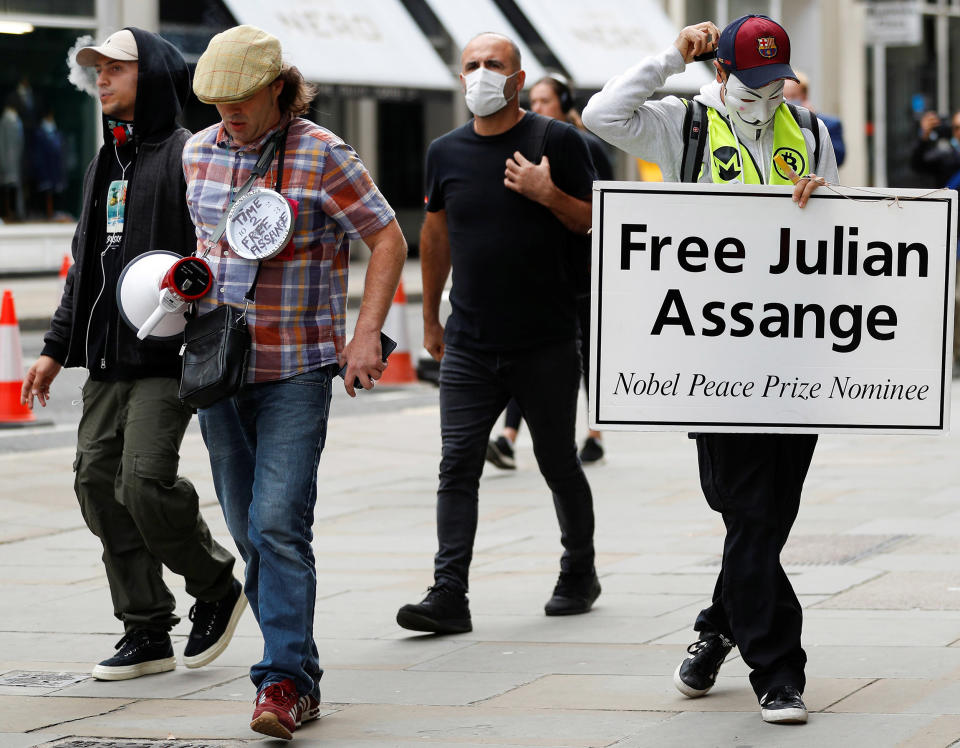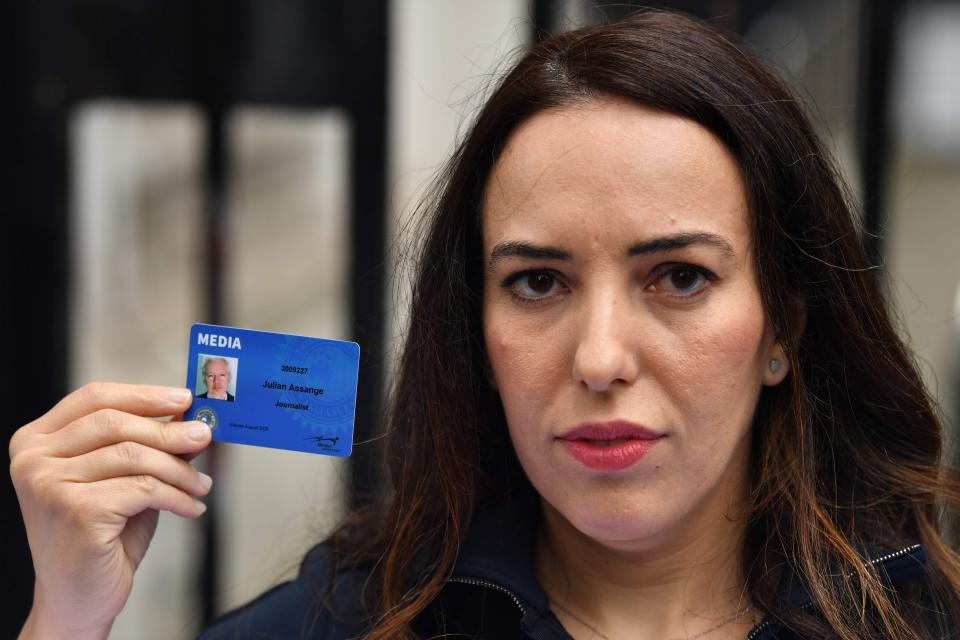WikiLeaks founder Julian Assange appears in U.K. court to fight extradition to U.S.
LONDON — WikiLeaks founder Julian Assange appeared in a British court Monday as he fought extradition to the United States where he faces up to 175 years in prison on espionage charges.
Assange, 49, sat separated by glass and guarded by two men as he heard the case, answering “No” when asked whether he was prepared to consent to be extradited.
He faces 18 charges, including conspiring to hack government computers and violating an espionage law. Prosecutors say the Australian national conspired with U.S. army intelligence analyst Chelsea Manning to hack into a Pentagon computer and release hundreds of thousands of secret diplomatic cables and military files on the wars in Iraq and Afghanistan.
Assange, who is being held at a high security prison in east London, and his supporters say the leaked documents exposed U.S. military wrongdoing, and argue he was acting as a journalist.
Among the files published by WikiLeaks in 2010 was a video of a 2007 Apache helicopter attack by American forces in Baghdad that killed 11 people, including two Reuters journalists.

The hearing began in February but it was postponed in April because of the coronavirus pandemic.
After the case was postponed, the U.S. Department of Justice issued a new indictment in June, which said that Assange sought to recruit hackers at conferences in Europe and Asia who could provide his anti-secrecy website with classified information, and conspired with members of hacking organizations.
Although the superseding indictment does not contain additional charges beyond the 18 counts the Justice Department unsealed last year, prosecutors said it underscored Assange's efforts to procure and release classified information, allegations that form the basis of criminal charges he already faces.
On Monday, Assange’s legal team asked the judge to rule out new allegations contained in the new indictment.
Mark Summers, one of Assange’s lawyers, said that the fresh allegations came “too late” and were “unfair” as the defense team did not have the time to properly respond to them.
Later in the day, he asked for the extradition case to be adjourned till January, but the judge denied his request, saying it would lead to significant delays in the case.
In their defense submissions shared with the media on Monday, Assange’s lawyers said their client’s prosecution is “not motivated by genuine concerns for criminal justice but by politics," adding that it's the result of President Donald Trump’s “effective declaration of war on leakers and journalists.”
Assange’s vulnerable mental state and high risk of suicide if he is extradited to the U.S. will also form part of their case.
Download the NBC News app for breaking news and politics
Ahead of the hearing, Assange's partner and mother of his two sons, Stella Moris, said in statement that he "had no access to his lawyers for six months."
U.K.'s justice ministry told NBC News on Monday that all prison visits were temporarily cancelled during the coronavirus lockdown with visits slowly beginning to restart. A press officer with the ministry said the prison where Assange is being held is now running a limited visit schedule.
"Two weeks ago, I was able to see him for the first time since lockdown," Moris said. "He looked a lot thinner than on my last visit. He was in a lot of pain and his health is not good."
Along with her sons Gabriel, 3, and Max, 19 months old, she said she was "warned by the prison staff that if they tried to touch him, the visit would be ended."
She told a British morning show that she didn't think Assange would survive an extradition to the U.S., calling it "catastrophic."

Assange fathered the boys while he was living in the Ecuadorian Embassy in London. He stayed there for seven years in a self-imposed exile to avoid extradition to Sweden where he was facing rape allegations.
Those charges were dropped several months after Assange was evicted from the embassy in April 2019 and arrested by British authorities.
Several dozen Assange supporters, including fashion designer Vivienne Westwood, gathered outside the courtroom ahead of the hearing, with many holding "Don't extradite Assange" banners.
Assange's father, John Shipton, was also there, telling Reuters his son's hearing was "an oppression for journalism and free press everywhere in the Western world."
WikiLeaks' editor-in-chief Kristinn Hrafnsson told Assange's supporters outside the court that “the future of journalism is at stake.”
On Monday, the U.K.'s National Union of Journalists renewed its call for the British government to dismiss the extradition request.
"If this extradition is allowed, it will send a clear signal that journalists and publishers are at risk whenever their work discomforts the United States government," a statement from the union said.
The human rights organization Amnesty International said ahead of the hearing that if Assange is prosecuted, it could have "a chilling effect on media freedom" that could lead to self-censorship.
The judge is expected to take weeks or even months to consider her verdict, with the losing side likely to appeal.
If the courts approve extradition, the British government will have the final say.
The case comes at a delicate time for transatlantic relations as the U.K. is keen to strike a post-Brexit trade deal with the U.S. after leaving the European Union.
The Associated Press contributed to this report.

